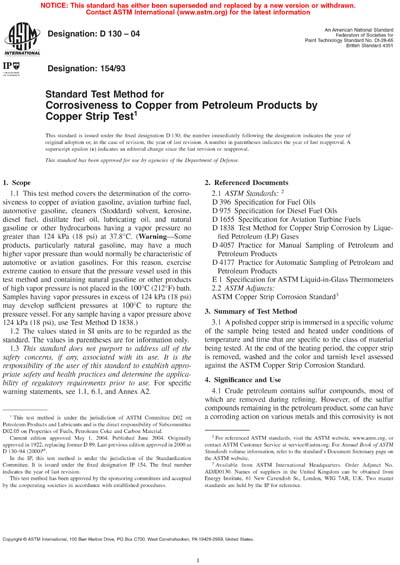Historical
ASTM D130-04
Standard Test Method for Corrosiveness to Copper from Petroleum Products by Copper Strip Test
This test method covers the determination of the corrosiveness to copper of aviation gasoline, aviation turbine fuel, automotive gasoline, cleaners (Stoddard) solvent, kerosine, diesel fuel, distillate fuel oil, lubricating oil, and natural gasoline or other hydrocarbons having a vapor pressure no greater than 124 kPa (18 psi) at 37.8 degrees C. (Warning - Some products, particularly natural gasoline, may have a much higher vapor pressure than would normally be characteristic of automotive or aviation gasolines. For this reason, exercise extreme caution to ensure that the pressure vessel used in this test method and containing natural gasoline or other products of high vapor pressure is not placed in the 100 degrees C (212 degrees F) bath. Samples having vapor pressures in excess of 124 kPa (18 psi) may develop sufficient pressures at 100 degrees C to rupture the pressure vessel. For any sample having a vapor pressure above 124 kPa (18 psi), use Test Method D 1838.)1.2 The values stated in SI units are to be regarded as the standard. The values in parentheses are for information only.1.3 This standard does not purport to address all of the safety concerns, if any, associated with its use. It is the responsibility of the user of this standard to establish appropriate safety and health practices and determine the applicability of regulatory requirements prior to use. For specific warning statements, see 1.1, 6.1, and Annex A2.
ASTM International [astm]

